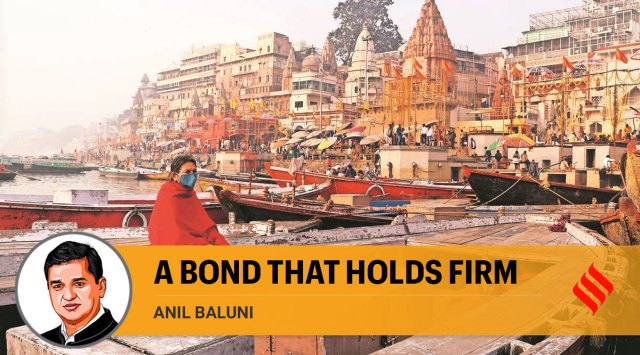
Uniting India spiritually, culturally and historically has been one of the main missions of Prime Minister Narendra Modi. A sterling example of this is the month-long “Kashi-Tamil Sangamam”, which will culminate on December 16 in the world’s oldest living city — Kashi, also known as Varanasi.
While inaugurating this cultural and spiritual extravaganza last month, PM Modi said that “Kashi is the cultural capital of India whereas Tamil Nadu and Tamil culture are at the centre of India’s antiquity and glory”. He drew several parallels between Kashi and Tamil Nadu to give the message that India is a united country, and its traditions and heritage are strongly interwoven.
The Kashi-Tamil Sangamam is the confluence of Kashi and Tamil Nadu, which are timeless centres of Indian civilisation. It is an effort to strengthen the bond between the North and South, make people aware of the cultural proximity of the two centres and bring the young generation closer to great Indian traditions, arts, culture and religion.
Today, Kashi’s glory has been restored as the global centre of spiritualism and culture. We also have Dakshin Kashi in Tamil Nadu. When PM Modi says both have their importance in the form of “Kashi-Kanchi” in the “Sapta Puris” (the seven holy pilgrimage sites in Hinduism), he takes us on a journey from Baba Vishwanath Dham in Kashi to Lord Rameshwaram in Tamil Nadu.
PM Modi says, “Both Kashi and Tamil Nadu are the birthplaces and ‘karma bhoomi’ (workplace) of the greatest acharyas of Indian spirituality. Kashi is the land of devotees of Tulsi, while Tamil Nadu is the land of Saint Thiruvalluvar. You can find the same energy in different colours of Kashi and Tamil Nadu in every sphere and dimension of life…This eternal love for Kashi is in the Tamil hearts, which never faded away in the past, nor will it ever fade away in the future”. The Kashi-Tamil Sangamam has also helped to bring the Hindi and Tamil-speaking people closer. PM reminded us that the names of several temples and towns in Tamil Nadu have been named after Divya Kashi while a sizable Tamil population has made Kashi home.
Held at a time when India is celebrating Amrit Kaal, the Kashi-Tamil Sangamam signifies that we might speak different languages, and follow different cultures and traditions, but we all are Indians.
Now, the next stop of the Tamil Sangamam will be Kutch. It is said that hundreds of years ago a large population from the Kutch-Saurashtra region migrated to Tamil Nadu. Today, a large number of Gujarati-origin people live in Madurai and other parts of Tamil Nadu.
PM Modi has never missed a chance to make people aware of the richness of Tamil culture and literature. During his speeches at various important domestic and global platforms, he talked at length about the greatness and contributions of Tamil culture, traditions and literature. He is on a mission to give the Tamil culture and traditions their due.
In January, the PM inaugurated the new campus of the Central Institute of Classical Tamil, while the Banaras Hindu University established the Subramania Bharathi Chair in honour of the great freedom fighter who lived in Kashi for a very long time.
Who can forget that in 2019, while addressing the 74th session of the UN General Assembly, Prime Minister Modi said: “About 3,000 years ago, a great poet of India, whose name was Kaniyan Poongundranar, wrote in Tamil, which is the most ancient language of the world: “Yaadhum oorae, yaavarum kaeleer’”(we belong to all places, and we belong to everyone). This sense of belonging beyond borders is unique to India”
India has been the fountainhead of many civilisations and cultures. But over the centuries, our callousness and lackadaisical attitude towards our rich traditions, art and literature have let them fade away. When people across the world come to know that the world’s oldest language, Tamil, is Indian, they are surprised. As PM Modi says: “It is the responsibility of the 130 crore countrymen to preserve Tamil heritage as well as enrich it. If we ignore Tamil, we do a great disservice to the nation… We have to remember to remove linguistic differences and establish emotional unity.”
During the past eight years, PM Modi has made us all aware of India’s rich diversity and the strength of our unity. To amplify this, he had asked every Indian to take “Panch Pran” (five pledges) of Amrit Kaal. These are: Making a developed India, removing the colonial mindset, taking pride in our roots, unity, and inculcating a sense of duty among citizens. Modi is on a mission to fulfil his commitment to “Ek Bharat, Shreshth Bharat”.
Now contrast this with actions of Opposition parties that are creating rifts in the society, siding with anti-India forces and taking out divisive “yatras” for petty political gains.
As Prime Minister Modi aptly said while inaugurating the Sangamam — “In our country, there is a tradition of remembering 12 Jyotirlingas from ‘Saurashtre Somanatham’ to ‘Setubandhe tu Ramesham’ after waking up in the morning. We start our day by remembering the spiritual unity of the country. We recite mantras while taking bath and worshipping. We have to strengthen this tradition and heritage of thousands of years and make it the thread that unites the country. The Kashi-Tamil Sangamam will become a platform for this resolution. This will make us realise our duties and will energise us to strengthen national unity.”
The writer is Rajya Sabha MP and BJP National Media Head